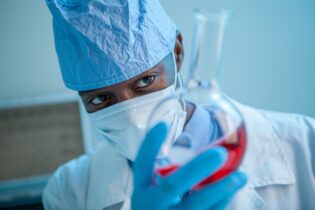There is very little that is efficient in drug discovery and development. Approximately 90% of medications that reach commercialisation fail. Each one costs more than $1 billion and takes ten years to develop.
However, technical developments in data collection are advancing artificial intelligence in drug discovery, which might open the door to discovering treatments for disorders that have eluded medical researchers for millennia.
How Does Drug Discovery Work?
Drug discovery procedures are often drawn-out and laborious. Academic or industrial scientists create molecules. They search for ‘targets’ (such as proteins), where the molecule can go in the body to deliver treatment.
Researchers must ensure that the molecule doesn’t mistake a healthy protein for a target. Otherwise, a drug floating about in the body may bind to and destroy a healthy cell, causing a poisonous effect. Once a target is obtained, it is removed from the body and tested against molecules in the laboratory to see what sticks.
However, when clinical trials move forward, many of these medications fail due to unanticipated toxicity in the body or the drug itself not performing as well in people as it did in the lab. This is why most investments fail.
Fortunately, artificial intelligence (AI) can improve the efficiency of drug discovery.
AI Improves Drug Discovery
Platforms for drug discovery can more accurately forecast the effects of drugs early on by utilising data. AI links molecules with targets and models how they will behave within the body, increasing the likelihood that they will survive clinical trials and reduce patient toxicity rates.
Although the impact of AI on conventional drug discovery is still in its infancy, when AI-enabled capabilities are added to a traditional process, they can significantly speed up or otherwise improve individual steps and lower the costs of conducting expensive experiments. AI algorithms can alter the majority of discovery jobs (such as the design and testing of molecules) so that physical trials are only necessary to confirm findings.
Pharma companies are partnering with AI drug discovery platforms, with Amgen and Generate Biomedicines announcing a deal worth up to £1.9 billion in 2022.
Pharma businesses need to prepare for a future in which AI is frequently utilised in drug research, given the revolutionary potential of AI. The applications are many, and pharma businesses must decide where and how AI can best contribute.
New players are ramping up quickly and providing considerable value. In practice, this entails taking the time necessary to comprehend the full impact that AI is having on R&D. This includes separating hype from real accomplishment and realising the distinction between standalone software solutions and end-to-end AI-enabled drug discovery.
Read the full article here.






